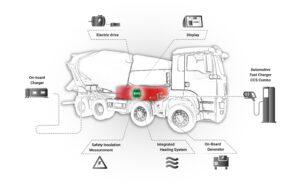Have you ever wondered why does my charger make a high pitched noise? It can be quite annoying, especially if you’re trying to concentrate or sleep. Well, I have some good news for you! There is a solution to this problem, and I’m here to help you understand why it happens and how you can fix it. In this article, we’ll dive into the reasons behind that pesky high pitched noise from your charger and provide some practical tips to silence it once and for all. So, let’s get started!
Why Does My Charger Make a High Pitched Noise?
If you’ve ever plugged in your charger and noticed a high pitched noise, you’re not alone. This common occurrence can be puzzling and concerning for many people. In this article, we will explore the reasons behind the high pitched noise emitted by chargers and what you can do about it.
Understanding Charger Noise
When a charger is plugged into an electrical outlet and connected to a device, it typically starts working silently. However, in certain cases, you may notice a high pitched noise coming from the charger. This noise can vary in intensity and duration, and it can be quite annoying. But what causes it?
There are several potential reasons why your charger may make a high pitched noise:
1. Transformer Vibration
One common cause of charger noise is the vibration of the transformer inside the charger. Transformers are essential components of chargers that convert the AC power from the electrical outlet to the DC power needed by your device. Due to their construction, transformers can emit audible noise when the electrical current passes through them. This noise is often in the form of a high pitched whine or buzzing sound.
2. Coil Whine
Coil whine is another possible reason for the high pitched noise in your charger. Coil whine occurs when electrical currents excite the magnetic fields within the charging components. This phenomenon can create vibrations that produce an audible noise. Coil whine is more common in chargers that operate at high frequencies.
3. Capacitor Noise
Capacitors are electronic components that store and release electrical energy. In some cases, these capacitors can generate noise due to factors such as their size, material, or voltage rating. This noise can manifest as a high pitched squeal or whistling sound.
Factors Affecting Charger Noise
While charger noise is a common occurrence, not all chargers will emit a high pitched sound. There are several factors that can affect the likelihood and intensity of charger noise:
1. Charger Design and Quality
The design and quality of the charger can significantly impact its noise levels. Chargers with better insulation and shielding tend to produce less noise. Higher quality components also contribute to reducing noise emission. If you’ve purchased a low-quality or poorly designed charger, it may be more prone to producing high pitched noise.
2. Charger Load
The amount of power being drawn from the charger can influence the noise levels. When a charger is under heavy load, such as when charging a device with a fast charging feature, it may generate more noise. This is because the components inside the charger are working harder to deliver the required power.
3. Electrical Environment
The electrical environment in which the charger is being used can also play a role in the noise it produces. Factors such as the stability of the electrical supply, interference from other devices, and the quality of the grounding can all impact the noise levels of the charger.
Dealing with Charger Noise
If the high pitched noise from your charger is bothering you, there are a few steps you can take to address the issue:
1. Replace the Charger
If you’re using a low-quality or worn-out charger, it might be worth investing in a better one. Look for chargers from reputable brands known for their quality. Opt for chargers that are designed to reduce noise emissions and provide reliable charging performance.
2. Adjust the Charging Conditions
As mentioned earlier, the charger load can affect the noise levels. If your device supports it, try adjusting the charging settings to a lower power output. This might reduce the strain on the charger and subsequently reduce the noise.
3. Change the Electrical Outlet
Sometimes, charger noise can be influenced by the electrical outlet you’re using. Electrical outlets with poor grounding or unstable power supply can cause noise issues. Try plugging your charger into a different outlet to see if the noise diminishes.
4. Use Ferrite Beads
Ferrite beads are small magnetic components that can help reduce electronic noise. They can be attached to the charger cable to suppress high-frequency noise. Consider purchasing ferrite beads designed for chargers and following the manufacturer’s instructions to use them effectively.
While a high pitched noise from your charger can be annoying, it is often harmless and does not indicate a significant issue. Understanding the factors contributing to charger noise and taking appropriate steps can help alleviate the problem. If the noise persists or is accompanied by other issues, it may be wise to consult a professional. Remember, choosing a high-quality charger and maintaining a stable electrical environment can ultimately enhance your charging experience.
Static and high pitched noise coming from fast charger when charger Samsung S21 phone.
Frequently Asked Questions
Why does my charger make a high pitched noise?
When chargers emit a high pitched noise, it can be concerning and potentially indicate an issue. Here are some frequently asked questions about why chargers make this noise and possible explanations.
What causes a charger to make a high pitched noise?
A high pitched noise from a charger is often caused by the flow of electricity through the transformer or other components. This noise can be a result of the charger’s design, electrical current fluctuations, or even certain charging modes.
Is a high pitched noise from my charger dangerous?
In most cases, a high pitched noise from a charger is not dangerous. It is usually a normal occurrence caused by the electrical current passing through the charger’s components. However, if the noise is accompanied by other issues like overheating or burning smells, it may indicate a problem and should be addressed.
Can I continue using a charger that makes a high pitched noise?
In general, it is safe to continue using a charger that emits a high pitched noise. However, if the noise becomes excessively loud or there are other signs of malfunctioning, it is advisable to replace the charger to prevent potential damage to your devices or electrical hazards.
How can I reduce the high pitched noise from my charger?
While it may not be possible to completely eliminate the high pitched noise, there are a few things you can try to reduce it. Firstly, make sure the charger is plugged securely into the power outlet and the device you are charging. Also, using a higher-quality charger or a charger with built-in noise filtering capabilities could help minimize the noise.
Should I be concerned about the high pitched noise if it’s coming from a wireless charger?
If the high pitched noise is coming from a wireless charger, it is likely due to the same reasons as a regular charger. The noise is generally harmless and should not cause any concern. However, if you notice any other abnormalities or issues with your wireless charger, it is recommended to consult the manufacturer or discontinue use if necessary.
Final Thoughts
A high pitched noise coming from your charger can be a cause for concern and annoyance. Typically, this noise occurs when there is an issue with the electrical components within the charger. It could be due to faulty wiring, loose connections, or problems with the transformer. In some cases, it may be a normal behavior caused by the charger’s design. However, if the noise is persistent or accompanied by other signs of malfunction, it is advisable to replace the charger to prevent any potential hazards. Therefore, if you have been wondering, “why does my charger make a high pitched noise,” it is important to address the issue promptly to ensure the safety and efficiency of your charging devices.



